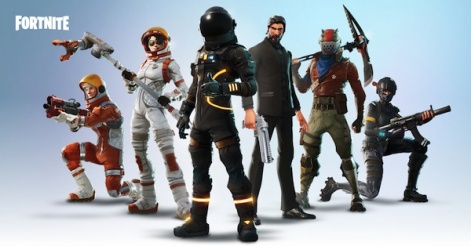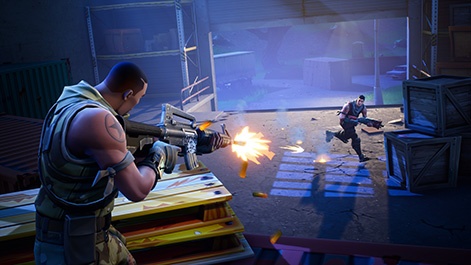Johannes Heinze is MD International at AppLovin.
If it feels like Epic Games' battle royale sensation Fortnite has taken over the world these past few months, that’s because it has.
The gaming community was already primed to adopt the game in droves, but Fornite’s leap into the broader cultural mainstream proves once again that the barriers between devices, and between channels, is quickly breaking down.
The game launched record-breaking livestreams, sparked social media memes and now routinely appears in sport’s biggest moments, and it’s mobile that’s the connective thread.
While it’s undeniably true that Fornite’s success has been remarkable, this level of attention for a game certainly isn’t unheard of.
Casual games like Candy Crush Saga and Angry Birds were placed under similar spotlights at their peak - the latter even eventually became its own feature film.
It was only two years ago that Pokemon Go launched and immediately generated the volume of headlines usually reserved for elections and surprise Beyoncé albums.
And long before that, the nation was intermittently gripped with game-fueled fevers from Pac-Man to Super Mario and more.
Cultural phenomenon
However, Fornite’s enormous success stands out in two ways.
First, unlike the more casual games above designed to be easily played by anyone and everyone, Fortnite is a decidedly more hardcore game. Even if it is more beginner-friendly than many other shooter games, it comes with a significant learning curve that far exceeds matching candy colours.

And not only is it a hardcore game, it’s a battle royale game. This newly emerging genre is a spin on the more established multiplayer shooters like Call of Duty in which up to 100 players square off to be the last remaining survivor on a constantly shrinking battle field, resulting in a level of unpredictability and variation that keeps players coming back.
While it’s undeniably true that Fornite’s success has been remarkable, this level of attention for a game certainly isn’t unheard of.
Also including the similar blockbuster game PUBG, the battle royale format looks like it's here to stay for the foreseeable future, with a host of new games lining up in hopes of riding the wave.
Second, and crucial for our purposes, Fornite successfully transitioned from consoles and PCs/Macs to mobile in a way we’ve never really seen before.
For years, common wisdom held that the large-scale experience and functionality of more complex games just couldn’t translate to mobile.
So instead of mobile versions of big PC and console games, we’ve instead gotten stripped down mobile versions with little real relation to their predecessors beyond a shared name.
For example, Batman Arkham Origins may have been birthed from the open world Batman adventure on PC and console, but in reality it was merely a touchscreen-controlled fighting game that lacked the story and depth of its PC and console counterparts.

Fornite has proven this ongoing assumption to be just that - an assumption. It turns out that not only is it is possible to make a mobile game that retains the functionality and fidelity of its original console, but it’s possible to do so with a level of quality that allows for cross-system play.
Cash royale
Seamless experience between devices is certainly no easy task, but Fornite has shown that it can be done, and that if done well, the rewards are enormous. How enormous?
- In the first week of April alone, Fortnite on iOS brought in $6.4 million in the US alone. This surpasses casual and midcore hits like Candy Crush Saga, Clash of Clans and Pokemon Go.
- When the Android version of Fortnite hits, Sensor Tower predicts that daily revenue could climb to about $3 million per day
- According to App Annie’s rankings, Fornite has remained a top five most downloaded iPhone app almost every day in the US since its launch, both in the game category and overall. That means that it’s now routinely outranking the likes of YouTube, Instagram and Facebook in the US.
Huge congratulations are obviously in order for Fornite, but let’s play devil’s advocate for a moment.
All of this success is great if you work for Epic Games, but for other developers and publishers... so what?
If you’re a publisher with a big console game (or have one in the works), it’s time to rethink what’s possible on mobile.
If you’re not making a battle royale game, why should you care? Is Fortnite’s story another case of an isolated success with relatively little applicability outside a specific genre or technology - like Pokemon Go and the so far limited applicability of augmented reality?
These questions are certainly valid. It is true that while Fornite shows that the audience for hardcore games is substantially broader than many thought, over the long-term, the overall appeal isn’t as broad as, say, Instagram.
And it’s also true that live PvP gamers spend more time and money on mobile than their non-PvP gamer peers, which helps explain some of Fortnite’s extraordinary revenue.
What are the real lessons?
While there are some factors that will be unique to Fortnite and battle royale games, there are generally still valuable lessons for any developer to learn here.
First, if you’re a publisher with a big console game (or have one in the works), it’s time to rethink what’s possible on mobile. Yes, a fuller mobile experience will certainly be worth the investment, but as we’ve seen above, even at a percentage of Fortnite’s success, the potential payoff is enormous.

Second, no matter what genre you’re in, it’s worth looking at the holistic role mobile has played in Fortnite’s success.
The modern user thinks nothing of playing a game on console or their PC/Mac, uploading a video of themselves dancing to it on their phone, then picking up their game again while traveling to a watch the game played live.
Fortnite has even taken the extra step of incorporating user-generated content back into the game itself, completing the virtuous circle. In other words mobile doesn’t cannibalise console play; it increases appetite.
All the stars are aligning for the next era of mobile gaming to arrive. New gamers in emerging markets will increase the user base exponentially in the coming years and mobile hardware has advanced to the point that more full-featured games are possible.
We can see this combination of audience size and capability coming together in the inarguable success of Nintendo Switch - which has already sold more in the first year of its life than its predecessor, the Wii U, did in its own lifetime - and we can see it in Fornite, PUBG and others.
The dominance of mobile gaming has already been established and the market for console games in a handheld format is here - it’s growing and it’s only going to increase. The only question is: Are you ready?
Get the latest news, interviews and in-depth analysis on Twitter, Facebook and our daily newsletter.





















